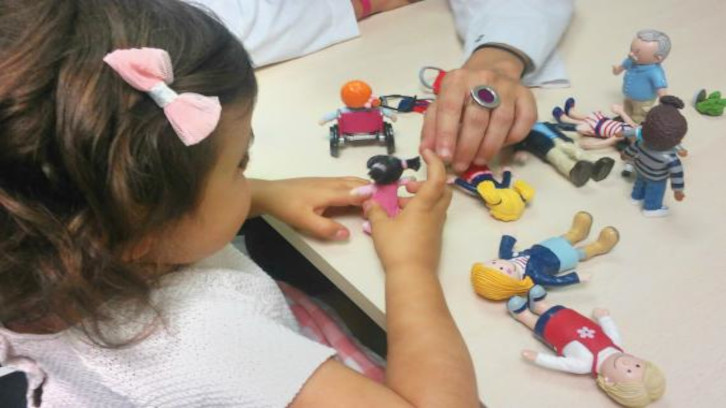First study from southern Europe on the quality of life of children and young people affected by primary immunodeficiencies

Primary Immunodeficiencies (PIDs) are rare diseases affecting 1 in every 2,000 live births. This study evaluates how they affect multiple dimensions related to the quality of life of children and young people. The main effects correspond to the field of social relations and mental wellbeing. The results obtained will make it possible to improve current medical interventions and the Vall d'Hebron's Universitary Hospital programme “Tinc IDP: no estic sol”, which was founded in 2016 to offer support to those suffering from PIDs
Primary immunodeficiencies (PID) are a group of more than 430 genetic disorders caused by abnormalities of the immune system. PID are considered rare diseases because they affect 1 in 2,000 live births. PID are defined by an increased susceptibility to recurrent and / or severe infections and a predisposition to develop allergies, autoimmunity, inflammation and cancer, among other manifestations. PID can occur at any age; however, it appears frequently in children. Although the survival rate and prognosis have improved in recent years, patients with PID still have a higher risk of developing complications that affect their physical and emotional health. It is group of chronic diseases that limit social activities of patients and increases the risk of school and work absenteeism caused by limitations of physical contact, hospital visits, hospitalizations and complex treatments. These restrictions affect the patient's quality of life and psychological health by increasing the likelihood of symptoms of anxiety and / or depression. Therefore, assessing the quality of life in patients with a chronic disease is key to better understanding the progression of the disease and providing them with the most appropriate care.
Since 2016, at Pediatric Infectious Diseases and Immunodeficiencies Unit at Hospital Universitari Vall d’Hebron we have developed the "I have a PID. I'm not alone" program that aims to provide psychological support to PID patients and their families. In this context, 70 patients (children and adolescents) with PID and 140 relatives benefited from the program. It is led by a psychologist who works with patients and families on the following topics: understanding the disease, accepting the diagnosis, adhering to treatment and managing symptoms of anxiety and depression if required. The aim of this psychosocial care project is to improve the quality of life of children with PID and their families.
There is little literature describing quality of life and fatigue in children affected by PID. For this reason, our study "Health-related quality of life and multidimensional fatigue in children with primary immunodeficiency" was conducted. This work is the first study in Southern Europe to assess quality of life and fatigue in pediatric patients and young adults with PID.
Data from our study show that patients with PID have a low quality of life and high fatigue in all dimensions studied compared to healthy population and in some dimensions compared to other chronic diseases such as asthma, diabetes mellitus or cystic fibrosis. The fact that the school / work area - followed by the emotional dimension- was the dimension with the lowest score as reported by patients and caregivers, can be explained by the high hospital attendance, hospitalizations and related absenteeism. In addition, it has been found that quality of life and fatigue differ depending on gender with female participants reporting lower scores than male participants.
Although no significant differences were found between quality of life and age, data from our study show a trend of worse quality of life at older ages. This could suggest that the progression of the disease, which is usually characterized by an increase in the number and / or severity of complications and the need for chronic treatment, has a negative effect on quality of life. It should also be noted that younger patients have had access to the latest innovative therapeutic options such as hematopoietic stem cell transplantation, gene therapy and / or early diagnosis techniques such as neonatal screening, which have proven to be an important step forward to successfully treat PID.
Variables defined by professionals, such as the ECOG scale and the degree of patient dependence, showed a negative correlation with quality of life and fatigue, which confirms that the professional assessment coincides with that of the patient and caregivers and promotes an active role of all health professionals in detecting potential patients. In this regard, our data can help evaluate the effectiveness of future interventions aimed at improving the quality of life and fatigue of patients with PID. It has also made it possible to review the intervention model, methodology and resource allocation that our unit currently offers.
Pediatric Infectious Diseases and Immunodeficiencies Unit.
Hospital Universitari Vall d’Hebron.
Vall d’Hebron Barcelona Hospital Campus.
Universitat Autònoma de Barcelona (UAB).
References
Ridao-Manonellas S, Fábregas-Bofill A, Núñez-Rueda G, González-Amores M, García-Prat M, López-Seguer L, Rivière JG, Martín-Nalda A, Mendoza-Palomar N, Melendo-Pérez S, Soler-Palacín P. Health-Related Quality of Life and Multidimensional Fatigue Scale in Children with Primary Immunodeficiencies. J Clin Immunol. 2020 May;40(4):602-609. doi: 10.1007/s10875-020-00775-w. Epub 2020 Apr 15. PMID: 32291562.

